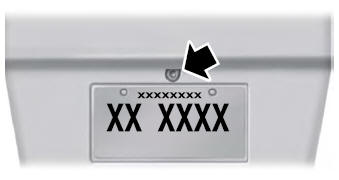Lincoln Corsair: Starting System - 2.0L EcoBoost (177kW/240PS) – MI4 / General Procedures - Starter Amperage Draw Test
Lincoln Corsair 2020-2026 Service Manual / Powertrain / Engine / Starting System - 2.0L EcoBoost (177kW/240PS) – MI4 / General Procedures - Starter Amperage Draw Test
NOTE: Make sure the test is performed with the engine at 60.8 °F ( 16 °C) or above.
-
Make sure the battery is fully charged.
For additional information, refer to: Specifications (414-01 Battery, Mounting and Cables, Specifications).
-
Disable the Fuel System. For Gasoline engines refer to:
For additional information, refer to: Fuel System Pressure Release (310-00A Fuel System - General Information - 2.0L EcoBoost (177kW/240PS) – MI4, General Procedures).
. For Diesel engines refer to: Wiring section for fuel pump inline connector location.
-
Connect the 0-500-amp probe to the starter B+ Cable and to the VCMM .
-
Connect the VCMM and use the Oscilloscope option scaled to 100/A/Div. Add PIDS "Ambient Air Temp" and "Engine RPM".
-
Crank the engine, no more than 6 seconds at a time.
NOTE: Allow 2 minutes between tests to allow for starter cooling to prevent overheat and damage to the motor.
-
Record the results, specifically Ambient Air Temperature
(AAT), Starter Current (Current Clamp) and Cranking speed (PCM signal
Engine_Speed).
-
Compare the results to the specifications in the workshop manual.
For additional information, refer to: Specifications (303-06A Starting System - 2.0L EcoBoost (177kW/240PS) – MI4, Specifications).
-
If both signals do not meet specification replace the starter motor.
For additional information, refer to: Starter Motor (303-06A Starting System - 2.0L EcoBoost (177kW/240PS) – MI4, Removal and Installation).
-
Clear all CMT DTC s.
 Diagnosis and Testing - Starting System
Diagnosis and Testing - Starting System
Diagnostic Trouble Code (DTC) Chart
Diagnostics in this manual assume a certain skill level and knowledge of Ford-specific diagnostic practices.REFER to: Diagnostic Methods (100-00 General Information, Description and Operation)...
 General Procedures - Starter Motor Drive Gear and Flywheel Ring Gear Inspection
General Procedures - Starter Motor Drive Gear and Flywheel Ring Gear Inspection
Inspection
Remove the starter motor.
Refer to: Starter Motor (303-06A Starting System - 2.0L EcoBoost (177kW/240PS) – MI4, Removal and Installation)...
Other information:
Lincoln Corsair 2020-2026 Service Manual: Removal and Installation - Rear Seatbelt Buckle RH
Removal NOTE: Removal steps in this procedure may contain installation details. Remove the RH rear seat cushion. Refer to: Rear Seat Cushion Cover (501-10B Rear Seats, Removal and Installation). Disconnect the RH seatbelt buckle electrical connector...
Lincoln Corsair 2020-2026 Service Manual: Description and Operation - External Controls - System Operation and Component Description
System Diagram E350598 *.sttxt { visibility: hidden; } *.stcallout { visibility: visible; } 1 Driver ..
Categories
- Manuals Home
- 1st Generation Lincoln Corsair Owners Manual
- 1st Generation Lincoln Corsair Service Manual
- Warning Lamps and Indicators
- Automatic Transmission - 8-Speed Automatic Transmission – 8F35/8F40
- Refueling - Gasoline
- New on site
- Most important about car
360 Degree Camera Cameras
Locating the Rear View Camera

The rear view camera is on the tailgate.
Locating the Front View Camera
Copyright © 2026 www.licorsair.com
